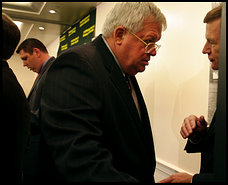 Over the weekend, I had a friend over who had not previously been to my apartment. Eying my few Wonder Woman figures, mugs, and books, he expressed some surprise. Clearly he has never known a true comic
Over the weekend, I had a friend over who had not previously been to my apartment. Eying my few Wonder Woman figures, mugs, and books, he expressed some surprise. Clearly he has never known a true comic At first the question took me totally by surprise. How could anybody, especially another gay man, not see Wonder Woman’s innate fabulousness? Doesn't Wonder Woman’s appeal simply resonate through her very visage?
After I ordered my ex-friend to leave my house, I began to think about his question. Part of my affection for Diana, of course, centers on some childhood memories (discussed a bit in this post). She is one of the few childhood pop-culture memories that hasn't yet been totally burned. George Lucas’s abominations, known as Episodes I-III, ruined the Star Wars mythology forever. Forever. The Black Hole, as we have discussed, is far too creaky to really obsess over as an adult. So, from those big three of my childhood, that leaves Wonder Woman. I have little doubt that Joss Whedon will soon trash that as well. Whedon's interviews have shown almost no understanding of the character. Instead, he wants to simply make a brunette Buffy. That, though, is another entry.
I am hardly alone in my love for the Amazon Princess. Gay men of a certain age often share the Lynda-Carter series as a fond childhood memory. Some take it to far greater extremes than even I. For instance, I only joke about sewing a Wonder Woman costume. This guy sewed his own costume, wore it, and won an award. That’s real devotion and I want to be his friend:
All of this makes me wonder, just why are gay men drawn to certain iconic women figures? Their names are easy to conjure and border on the gay stereotype: Cher, Bette Davis, Jacqueline Kennedy, Lucille Ball, Wonder Woman, and countless others. Anecdotal evidence suggests that queer interest in these women starts in our childhoods, long before most of us even have the language to express our queer sexual desires.
Not every gay boy, obviously, loves every gay icon. I, for instance, found neither Streisand nor Bette Middler all that interesting. Yet, even if we don’t personally share the love for particular figures, we can’t deny their durability within the community. Attend any large gathering of drag queens and you will find all the usual suspects.
Young gay boys don’t just randomly select any woman to idolize. Joan Crawford slinging a gun captures our imagination. Or, even better, Faye Dunawy playing Joan Crawford slinging a can of cleanser really gets our blood going. Few queer boys, though, remember or care about Veronica Lake or Gene Tierney. What makes us choose one figure over another probably has some of the same randomness as what makes the larger public suddenly make any individual a star.
Queer boys, though, focus on women characters that share some basic elements. From Cher to Wonder Woman, our women icons all blended and bended masculine and feminine gender expectations. The women who attract our attention generally fought for success in traditionally masculine roles. In films or in real life, queer-women-icons did everything from shrewdly running a business to making the axis powers fold. Because they succeeded in men’s realms, they often faced sexist criticism.

Yet, they also retained their sexual attractiveness throughout. They were not at all asexual. If anything, they appeared above the mundane middle-class concerns about sexuality.
During our youth, most of us couldn’t claim a desire for same-sex sex. During the seventies, finding a positive image of a gay man was as rare as a tank of gas. We therefore clung to anybody who rebelled against the gender status quo.
In our society, ideas about sexuality and gender intertwine. In the twentieth century, the most popular images of gay men and lesbians showed them as either androgynous or as clownish imitators of heterosexual men and women. Medical authorities even named homosexuals “the third sex” during the first half of the century. Real happiness, these experts told us, only came to men who behaved like Neanderthals and women who spent their days mindlessly baking cookies. Everybody who fell outside those roles were trapped in a gender purgatory.
Given these societal pressures to conform to gender roles and heterosexuality, it’s not hard to see why claiming a gay identity felt like a scary and alienating divorce from the rest of society. We simply didn’t see many happy alternatives for men-loving-men. Developing into an adult filled many of us with dread if it meant we had to conform to a heterosexual world. In reality, we also saw that marriage trapped many of the heterosexuals who surrounded us as well. We searched for any alternatives.
Seeing powerful women toss out the expectations for feminine gender roles and heterosexual marriage resonated with our desires to avoid the same traps. They also showed that having feminine traits was not the same as lacking power or agency. Every time Cher disparaged Sonny’s height or announced her dissatisfaction with married life, we saw alternatives, however small, to the vision of gender handed to us from every other angle. Even endlessly recycled images provided options, like Scarlett O’Hara. The Southern belle succeeded both in business and in getting all the men at Twelve Oaks (through she accomplished the first using slave labor and the latter through lies and manipulation – but that’s is another entry entirely). Despite doing decidedly masculine behaviors and bucking social conventions, Scarlett was never a bridesmaid. She somehow always ended up the bride.

These iconic women also often tapped into a familiar pattern of constantly inventing a public self. The masks, poses, and costumes donned by people like Cher and Madonna spoke to the performance and gender-drag that we all do. Taking it to extremes, these women showed the farce of gender.
In the case of the television version of Wonder Woman, we got some basic fantasies about super powers and magic. Others have also suggested that all comic heroes appeal to gay men because of the “secret identity” and “double-life” narratives.
Wonder Woman had other appeals for young queer boys as well. You didn’t need to be Freud to piece things together about her single-gendered homeland. Even the youngest child thought to ask, “If there were no men on Paradise Island, just how did they have babies?” The slightly more precocious kids cut to the chase, “What about sex? Did this mean that *gasp* they had sex with each other? Can two women have sex together? Does that mean two men can too? Is that a possibility?” Boy, howdy, is it!
The ABC and CBS versions of Wonder Woman downplayed the homoerotic elements of Diana’s Amazon sisters. Instead, Paradise Island appeared as a never-ending slumber party, complete with flouncy, shortie nighties that all the Amazons wore. Those must have been really convenient for all that building, hiking, and jumping they did. Apparently the Amazons spent their days alternating between Olympic competitions and tickle fights. The comic, especially the Marston-era comics, suggested a much more erotic island paradise.

In either version, though, Diana appears as both the greatest hero and the largest outcast on both the island and in “man’s world.” Contrary to attempts to name Wonder Woman a lesbian, it was actually her very heterosexual screaming-thigh-sweats for Steve Trevor that made her seem so queer to her Amazon sisters. They all liked being without men. That was normal. Diana seemed peculiar because of her desire for a man.
When Diana appeared in the United States, she found life confusing. Yet, her life also became a constant adventure. She never apologized for being herself. She didn’t get stuck always doing traditionally feminine tasks, like vapidly vacuuming, nor did she become a masculine dull jock thud. She had far more physical strength than all the men around her (what young queer boy didn’t want to be physically stronger than all the hetero boys surrounding him?), but she also had all the men’s attention. Even while stopping an airplane with her bare hands, she made sure her hair stayed in place.
Like many of us queer boys, Wonder Woman occupied a liminal space of gender and sexuality. She merged traditional masculine and feminine roles, packing them all in her nifty ol’-glory swimsuit.
Perhaps the more images we have of actual queer men, the less younger queer generations will canonize such female figures. For better or worse, the next generation of gay men came of age with shows like Will and Grace and Queer as Folk as common place. While very flawed, these types of shows gave them actual gay characters to look at. I, though, hope Wonder Woman always stays around the queer circles.
























